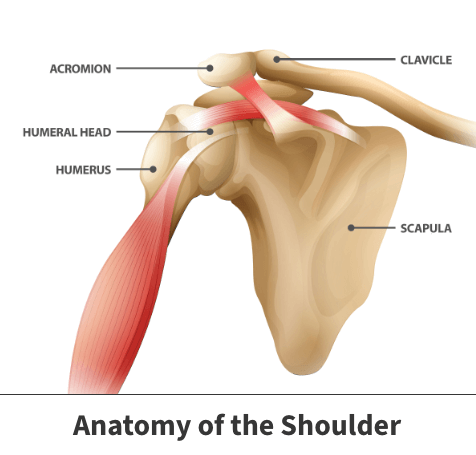Shoulder arthritis
Arthritis affects more than 50 million people in the United States. The shoulder is one of the most sensitive areas of the body, with inflammation and pain being the major symptoms of arthritis in this area. Although there is no definable cure for arthritis, treatment options are available to reduce stiffness and pain.
Anatomy

The shoulder consists of three bones:
- Humerus – upper arm bone
- Scapula – shoulder blade
- Clavicle – collarbone
The humerus, scapula, and clavicle fit together to form your shoulder. The socket that connects the humerus and scapula is known as the glenoid and can be a source of irritation from arthritis.
Various muscles and tendons keep your arm bone in place in the shoulder socket (also known as the rotator cuff). Either of the joints in the shoulder (the acromion and the acromioclavicular) can be affected by arthritis.
About
There are varying types of shoulder arthritis, each with their own treatment options:
- Osteoarthritis – A condition that destroys the smooth outer covering (articular cartilage) of bone. As this cartilage wears away, the space between the bones decreases and they will begin to rub against one another.
- Rheumatoid arthritis – Affects many joints throughout the body, usually on the same side. RA causes the synovium lining in your joints to swell, creating pain and stiffness. Since RA is an autoimmune disease, the immune system attacks the tissues in the body and makes them weaker.
- Posttraumatic arthritis – A type of osteoarthritis that comes after a shoulder injury.
- Rotator cuff tear arthropathy – A lasting rotator cuff tendon tear which creates friction between the humerus and acromion. This friction can create intense pain and weakness, limiting arm movement.
- Avascular necrosis – Occurs when the blood supply to the humerus is interrupted. Bone cells die without a blood supply, so this can create a breaking down of the shoulder joint. AVN can develop from steroid use, heavy alcohol consumption, sickle cell disease and shoulder fractures. It can also develop without a cause (idiopathic AVN).
Symptoms
Arthritis of the shoulder does not come with many symptoms outside of the usual pain and limited range of motion, but these can become more extreme the longer the injury remains untreated.
If the activity which originally caused the pain continues, this can lead to a breakdown of the bone and joints. It may become difficult to perform simple tasks such as reaching up to get something off a shelf.
It is not uncommon for those affected by shoulder arthritis to hear a clicking, snapping or grinding sound as you move your shoulder. Pain at night is also common and can cause trouble sleeping.

Diagnosis
Your Florida Orthopaedic Institute physician will ask about your medical history and if this is the first time you have experienced arthritic symptoms. They will then perform a physical examination to determine the degree of severity and type of shoulder arthritis.
In the physical examination, your physician will look for:
- Tenderness to touch
- Signs of previous injuries
- Pain when pressure is placed on the joint
- A grating sensation inside the joint (crepitus)
- Involvement of other joints (Rheumatoid arthritis)
- Any signs of injury to surrounding muscles, ligaments or tendons
- Extent of the range of motion
Your physician may also order imaging tests such as X-rays and other diagnostics to determine the type of shoulder arthritis.
Treatment
There are many surgical and nonsurgical treatment options available to reduce pain and decrease the severity of shoulder arthritis. Your physician will determine with you the type of treatment that best suits your injury and body.
Nonsurgical treatments
Florida Orthopaedic Institute provides patients with all nonsurgical treatment options before suggesting surgical ones. These can include:
- Rest or a change in daily activities from the ones that are causing shoulder pain
- Physical therapy
- Ice
- Nonsteroidal anti-inflammatory medications such as aspirin or ibuprofen (Advil, Motrin)
- Moist heat
- Corticosteroid injection
Surgical treatments
Shoulder arthritis is only treated surgically if conditions do not improve. Your physician may recommend the following surgical options to you depending on severity:
- Arthroscopy – Specific mostly to cases of mild glenohumeral arthritis, a small camera is inserted through small incisions into the shoulder joint to guide the surgeon. Your surgeon will clean out (debride) the inside of the joint to provide pain relief from the arthritis.
- Shoulder joint replacement (arthroplasty) – Advanced glenohumeral arthritis can be treated with shoulder replacement, where the damaged shoulder parts are replaced with prosthetics. Options for shoulder replacement can include hemiarthroplasty, total shoulder arthroplasty and reverse total shoulder arthroplasty.
- Resection arthroplasty – The most common surgical procedure for arthritis of the acromioclavicular joint. Your surgeon will remove a small amount of bone from the end of the collarbone to leave a space for scar tissue to fill in.
Your physician will determine and recommend the best surgical procedure for your injury’s needs.
Videos
Related specialties
- AC Joint Injuries
- Atraumatic Shoulder Instability
- Bankart Repair
- Bicep Tenodesis
- Broken Collarbone
- Bursitis of the Shoulder (Subacromial Bursitis)
- Calcific Tendinitis of the Shoulder
- Clavicle Fractures
- Dislocated Shoulder
- Fractures of the Shoulder Blade (Scapula)
- Glenoid Labrum Tear
- Impingement Syndrome of the Shoulder
- Little League Shoulder
- Reverse Total Shoulder Replacement
- Rheumatoid Arthritis (RA) of the Shoulder
- Rotator Cuff Tears
- Shoulder Arthroscopy
- Shoulder Injury: Pain in the Overhead Athlete
- Shoulder Replacement
- Shoulder Separations
- Shoulder Socket Fracture (Glenoid Fracture)
- SLAP Tears & Repairs
- Subacromial Decompression
- Trapezius Strain (Muscle Strain Of The Upper Back)
- Traumatic Shoulder Instability
